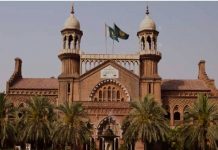Staff Report
ISLAMABAD: Caretaker Federal Minister for National Heritage and Culture Syed Jamal Shah on Friday said that Uzbekistan and Pakistan are connected by a centuries-old cultural relationship, which has strong roots in history. He said this while addressing the opening ceremony of the Photo Exhibition on Joint Cultural Heritage, along with the Ambassador of Uzbekistan in Pakistan, Oybek Arif Usmanov, organized by the patronage of Federal Minister for Culture and National Heritage, Syed Jamal Shah.
The minister said that 30 years after the independence of Uzbekistan is a small part of mutual modern cultural history, the two countries have been engaged in a mutual venture of literature, music and architecture for centuries, which is moving forward and strengthening after each passing day.
Jamal Shah said that the folklore in Pakistan literature has been adopted from the literature of Samarkand and Bokhara, the influence of which is still present in our folk literature. He said that the literary and cultural heritage of both countries is common and the writers and poets of both countries are equally popular on both sides.
He said that Pashto literature is closely related to the literature and culture of Uzbekistan, like Pashto Sufi poet Rehman Baba is also influenced by the culture and literature of Samarkand and Bokhara. The minister said that Uzbekistan’s ambassador to Pakistan understands Pashto and other regional languages very eloquently. He said that Uzbekistan is a significant part of the ancient silk route, from here there was trade between the countries of the region and other continents as well.
Jamal Shah said that Samarkand Bukhara is famous in the world for carpets and spices since ancient times and the commercial goods made by them are very popular here. Ambassador of Uzbekistan in Pakistan, Oybek Arif Usmanov said that today, “we are able to show to Pakistani public and Diplomatic representatives the retrospective and historical photos demonstrating the very active dynamic interaction of Uzbek and Pakistani leaders – Presidents, Prime Ministers and federal ministers.
He said that after 3 decades of our active interaction let’s focus on the connectivity strategy of our two regions South Asia and Central Asia – implementation of the projects for boosting trade and economics, transport linkages and cultural and people-to-people re-connectivity. He said that this strategic approach is also actively promoted by our country’s governments, experts community and most importantly supported by our young generation.
“Our connectivity logically emanates from the closeness of cultures and religious traditions – caravan’s roads of Central Asia with South Asia – Pakistan, China, Afghanistan, Sri Lanka, India, Nepal, Bhutan and Bangladesh.” Uzbek envoy said that the rich scientific and cultural legacy of such great Ulemas like Imam Al-Bukhari, Imam Al–Termizi, Al-Motrudi and Marghinani scholars as Abu Ali Ibn Sina, Al-Ferghany, Abu Raihan Al-Beruni and Zahiriddin Muhammad Babur, Allama Muhammad Iqbal, Mirza Ghalib is considered as a richest and common heritage of our religion.
He said the brilliant works of Rahman Baba, Khushhal Khan Hattak, Allama Iqbal, Jalaluddin Rumi, Makhtumquli Fraghi, Sadriddin Aini, Mirza Golib, Alisher Navoi are well-known in the world`s history, science and culture. Oybek Arif Usmanov said the period of our interactions was brightly manifested during the era of the Ghandhara, and Harappa civilizations, with the civilizations Saikhun and Jaihun rivers, Moghulistan and Khorasan cities -Samarqand, Bukhara, Khwarazm, Termiz which are the well-known centers of Islamic cultural enlightenment and sciences. “I am sure that all Pakistanis are well aware of the common great heritage of such dynasties like Amir Taymur’s, Zaheerudin Muhammad Babar’s. The great successors of Bukharys, Mughals, Barlas, Termizi, Mirsas in Pakistan are bright followers of our connectivity, promoting the mutual understanding among our nations, he said .” In the last years, our brotherly cooperation has been elevated to a level of strategic partnership due to confident political dialogue, and strengthening trade, industrial, and cultural cooperation. During the last three years, we together have increased bilateral trade via brotherly Afghanistan based on Transit and Preferential trade agreements. Oybek Arif Usmanov said that every year the bilateral trade is dynamically growing by 40-50% ($317 mln in 10 months 2023) and no doubt that our teams along with our colleagues will reach the goals of the recently signed 1 billion trade record. Let me express confidence that with the valuable and tireless efforts of the two sides, we will be able to gain remarkable results – strengthening people-to-people contacts and business-to-business forums while developing region-to-region connectivity. He said the relevant protocol on it was signed in Ashkhabad city, the capital of Turkmenistan on May 10 1992.
A copy of that document is also displayed today in our Exhibition. He expressed his appreciation to Federal Minister for National Heritage and Culture Syed Jamal Shah for his great support and guidance in arranging today’s event. Oybek Arif Usmanov also extended special thanks to Muhammad Ayoub Jamali DG of Pakistan National Council of Arts and his team for indispensable help and excellent cooperation in all arrangements of our Exhibition. The Ambassador admired two highly skilled artists – photographers Ramzan Mughal and Fazan Rabi who during the last several years made beautiful photos of our common national and cultural heritage.



